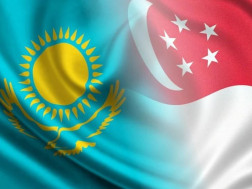Kazakhstan is the largest country in Central Asia. Located at the crossroads of Eurasia, Kazakhstan shares borders with Russia to the north, China to the east, Kyrgyzstan, Uzbekistan, and Turkmenistan to the south, and the Caspian Sea to the west. The capital of the country is Astana, and the largest cities is Almaty, Shymkent, Karaganda and Aktobe.
Kazakhstan boasts a diverse range of natural landscapes, including steppes, deserts, mountains, lakes, and rivers. This multi-ethnic state has a rich cultural and historical heritage. Kazakhstan is known for its hospitality, traditional customs, and culinary delights.
The economy of Kazakhstan is based on the extraction of natural resources such as oil, natural gas, uranium, coal, and others. The country also actively develops agriculture, industry, tourism, and other sectors.
Kazakhstan actively engages in international relations and is a member of various international organizations such as the UN, SCO, CSTO, and others. The country also participates in various regional and international initiatives aimed at promoting peace, security, and cooperation.
Kazakhstan is working towards modernizing its economy, improving education and healthcare, and enhancing the quality of life for its citizens. The country is actively seeking to attract investments, develop infrastructure, and create a favourable business climate.
Over the years, Kazakhstan has implemented various economic reforms to diversify its economy and reduce its dependency on oil and gas. The government has focused on developing other sectors such as agriculture, manufacturing, tourism, and information technology. Efforts have also been made to improve the business environment, attract foreign direct investment, and promote entrepreneurship.
Kazakhstan's strategic location at the crossroads of Europe and Asia has also contributed to its economic growth by facilitating trade and transit routes.
The Trans-Caspian International Transport Corridor (TITR) is a multimodal transportation route that aims to connect China and Europe through Central Asia and the Caucasus region, bypassing Russia. The corridor involves various modes of transportation, including rail, road, and maritime routes, to facilitate the movement of goods between Asia and Europe.
Here are some key points about the development of the Trans-Caspian International Transport Corridor:
1. Geographical Significance: The TITR leverages the geographical advantage of the Caspian Sea region, providing a shorter and more efficient route for trade between China and Europe compared to traditional routes that pass-through Russia.
2. Infrastructure Development: The development of the TITR involves improving and modernizing transportation infrastructure along the corridor, including railways, roads, ports, and logistics facilities. This infrastructure development aims to enhance connectivity and facilitate seamless transportation of goods.
3. Trade Facilitation: By providing a faster and more cost-effective transportation route, the TITR aims to boost trade between Asia and Europe, promoting economic cooperation and facilitating the movement of goods across borders.
4. International Cooperation: The development of the TITR requires close cooperation among countries along the corridor, including Kazakhstan, Azerbaijan, Georgia, and Turkey. These countries collaborate on infrastructure projects, customs procedures, and regulatory frameworks to ensure the smooth operation of the corridor
.
5. Role of Kazakhstan: Kazakhstan plays a crucial role in the TITR as it serves as a key transit country connecting China with Europe. The country has invested in upgrading its railway infrastructure, such as the Trans-Caspian Railway, to enhance connectivity and support the efficient movement of goods along the corridor.
6. Benefits: The TITR offers various benefits, including reduced transportation costs, shorter transit times, increased trade volumes, improved access to new markets, and enhanced regional cooperation. These benefits contribute to economic growth, job creation, and infrastructure development in participating countries.
Overall, the Trans-Caspian International Transport Corridor represents a significant initiative to enhance regional connectivity, promote trade integration, and stimulate economic development along its route. By leveraging its strategic location and improving transportation infrastructure, the corridor has the potential to facilitate greater trade flows between Asia and Europe while fostering closer cooperation among participating countries.
Rainer Michael Preiss, Partner & Portfolio Strategist at Das Family Office in Singapore
















